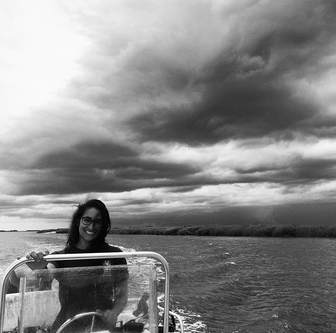Kimberly PrinceCurrently I am a fourth year PhD Candidate at the University of Florida in the Department of Environmental Engineering where I research the mechanisms by which polychlorinated biphenyls accumulate and magnify up coastal food webs. Prior to my graduate career I received a B.Sc. in Natural Resources and Conservation with a focus in environmental law and policy from UF in 2012.
|
What are polychlorinated biphenyls?
Once widely used in industrial processes, polychlorinated biphenyls (PCBs) are now known as one of the most pervasive pollutants in aquatic environments because their hydrophobic and lipophilic nature results in their predisposition to bind with particulate matter in aquatic environments and adipose tissues in organisms, respectively. These characteristics enable PCBs to bioaccumulate and magnify through the food chain, persist in the environment, as well as travel long distances through atmospheric processes involving air-water exchange and ocean currents. This global distribution exposes people and wildlife even in the most remote regions of the world, far from the industrial hotspots from where the contaminants were discharged. Despite their international ban via the Stockholm Convention in 2001, PCBs are still recorded in high levels, especially in marine apex predators. These high levels are also linked to impaired reproduction in these species, and pose risks to public health. This challenges scientists to better understand how PCBs continue to accumulate, predominantly in coastal areas where many chemical plants were located and where communities rely on estuaries for nutrition.
Fellowships & awards:
- HT Odum Graduate Fellowship (2018)
- Florida Sea Grant Newell Scholarship (2018)
- Southeast SETAC First Place Platform Presentation Award (2017)
- Melnick EES Scholarship Award (2017)
- Glick EES Scholarship Award (2017)
- SWS South Atlantic Chapter Research Grant (2017)
- HT Odum Graduate Fellowship (2016)
- SWS Student Research Grant (2016)
- Occidental Chemical Grant (2015)
- Graduate Student Fellowship Award (2015 )
Many thanks...
I would like to take this opportunity to thank those who have supported my research. Aside from my own sampling efforts, additional assistance in the field has been provided by locals from Sapelo Island and the recreational fishing community. I would also like to thank Coral Thompson MS, Emily Pisarski MS, Dr. Ed Wirth, the Angelini lab, Dr. Joe Delfino, my father, Dr. Eric Prince, and of course my advisor Dr. Angelini, for their blood, sweat, and laughs in the field and in the lab.
Additional support via donated gear, training, and collaboration was provided by:
University of Georgia Marine Institute
Georgia Department of Natural Resources
Georgia Coastal Systems Long Term Ecological Research monitoring program
South Carolina Department of Natural Resources
Florida Fish and Wildlife Conservation Commission
NOAA's Stressor detection and impacts division at the Hollings Marine Lab
Additional support via donated gear, training, and collaboration was provided by:
University of Georgia Marine Institute
Georgia Department of Natural Resources
Georgia Coastal Systems Long Term Ecological Research monitoring program
South Carolina Department of Natural Resources
Florida Fish and Wildlife Conservation Commission
NOAA's Stressor detection and impacts division at the Hollings Marine Lab

